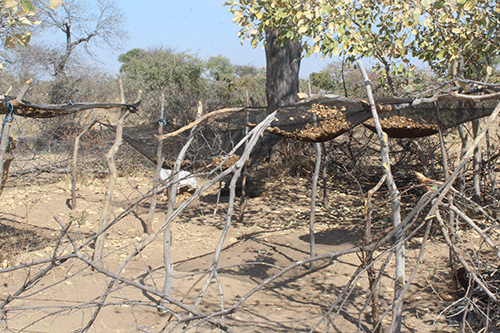Environment and tourism minister Pohamba Shifeta expressed concern that most of the country’s resources, specifically indigenous plant products, continue to be utilised for cosmetic or pharmaceutical purposes, without proper benefit-sharing arrangements.
He cited Devil’s Claw as an example, which has proven medicinal properties and is also important to the national economy.
The harvesting and sale of Devil’s Claw from the Nyae Nyae and N#a Jaqna conservancies significantly contributed to the income of women in those communities, despite the Covid-19 pandemic.
Native to southern Africa, Devil’s Claw (Harpagophytum procumbens) gets its name from the tiny hooks that cover its fruit. Historically, Devil’s Claw has been used to treat pain, liver and kidney problems, fever and malaria. It has also been used in ointments to heal sores, boils and other skin problems.
Shifeta revealed an amount ranging between N$20 million and N$30 million worth of Devil’s Claw has been exported to countries like Germany and France annually over the past five years.
“Over the years, these resources provided a supplementary income to vulnerable rural communities with limited agricultural harvests or livestock to fall back on. In addition, for that reason, we need to protect their rights,” he noted.
Devil’s Claw is known for its effective treatment of arthritis and rheumatoid arthritis, and it’s found in many parts of Namibia.
Shifeta maintained the days are over where the lack of legal certainty for access and benefit sharing served as an excuse to exploit communities that nurture biological and genetic resources and preserve the knowledge associated with their use.
In an attempt to protect local communities, Namibia has come a long way in its efforts to develop and enact laws to regulate access to biological, and genetic resources, and associated traditional knowledge and to enforce the sharing of benefits derived from utilisation.
The Access to Biological and Genetic Resources and Associated Traditional Knowledge Act, 2017 (Act No. 2 of 2017) was passed in parliament and in November 2021, it was operationalised with its regulations.
The Convention on Biological Diversity will hold its 15th Conference of Parties from 3 to 19 December, where delegates are required to negotiate and further deliberate on pertinent matters related to the Global Biodiversity Framework towards 2030 and the third objective of the convention in its attempt to advance decisions on equitable benefit sharing and sustainable utilisation.
The Act intends to regulate access to genetic resources and associated traditional knowledge; protect the rights of communities over genetic resources and its associated traditional knowledge and technologies to ensure administrative structures are in place to enforce such principles.
“Our expectation, henceforward, is that those who intend to access our biological and genetic resources and or associated traditional knowledge must apply for an access permit and follow all procedures related to compliance with this legislation,” Shifeta alluded.
According to him, the ministry through the access and benefit sharing office is ready to assist researchers, traders, exporters, investors, and communities with the relevant information that will facilitate access and use of these genetic resources.
The access and benefit sharing office is putting in place mechanisms, which include guidelines and other materials to help all stakeholders know how to manage the procedures for access, including negotiating fair and equitable benefits with the right holders. Therefore, the ministry believes the development of these mechanisms is a big milestone for the purposes of ensuring that the use of genetic resources is for national socio-economic development, poverty eradication, and prosperity for all.
“We need to recognise that meaningful and realistic benefits can only be realised through collaboration to ensure that the owners of the resources are aware of the potential value of the genetic resource so that benefits are realised through sustainable and controlled management of the resources,” he commented.
Therefore, he called upon all stakeholders to work with the said office within the ministry in creating awareness to facilitate compliance with the law and implementation of these mechanisms. The ministry is, however, concerned about effective implementation, and remains optimistic with the administering of the legal framework and its overall mandate, which is to ensure adequate implementation and compliance to this legislation.


